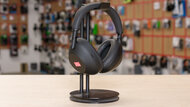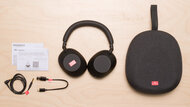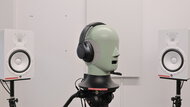Whether your phone has nixed the audio jack or you prefer the freedom of going wireless, Bluetooth headphones are a great way to enjoy your favorite music cable-free. There are a couple of disadvantages compared to wired headphones, like needing to keep an eye on battery levels and possible sync issues when watching videos, but not having to worry about tangled cords when you're running out the door on a busy morning makes wireless headphones worth it for many.
We've tested over 850 pairs of headphones, and below are our recommendations for the top wireless headphones to buy. Also, check out our recommendations for the best wireless earbuds, the best true wireless earbuds, and the best budget wireless headphones.
Quick Look






Looking for Black Friday savings on your next pair of headphones? We've got you covered! Check out our Early Black Friday 2025 Deals article for what's worthwhile this year.
-
Best Wireless Headphones
 Audio Reproduction Accuracy7.8Frequency Response Consistency6.0Travel8.5Office Work8.5Microphone (In Development)8.0Recording Quality7.7See all our test resultsNoise Isolation - Full Range9.7
Audio Reproduction Accuracy7.8Frequency Response Consistency6.0Travel8.5Office Work8.5Microphone (In Development)8.0Recording Quality7.7See all our test resultsNoise Isolation - Full Range9.7The Sony WH-1000XM6 are the best wireless headphones we've tested. These premium over-ears have an outstanding noise isolation performance thanks to their adaptive noise cancelling (ANC) system. They can cut down a wide variety of noise, from the low rumble of bus engines to ambient chatter and the high-pitched hum of A/C units. With their noise cancelling on, they last almost 32 hours continuously, so they can easily get you from point A to B, even if you have to travel across an ocean.
They have a very comfortable and lightweight fit, so you can wear them for hours without discomfort. Their slightly warm default sound profile is nice if you listen to genres like EDM and hip-hop since they deliver extra thump, punch, and warmth to audio. Plus, their mid-range and treble are clear, so you don't lose detail. You can fine-tune their sound to suit your tastes using their companion app's graphic EQ and presets, and they support multi-device pairing. If there's one obvious downside to these cans, it's their ear pad design: the seal the pads form with your head can be easily broken, changing the headphones' sound quite a bit. That's especially bad news for glasses wearers, who can experience a big drop off in bass while wearing these headphones.
The Bose QuietComfort Ultra Headphones (2nd Gen) are well worth considering if you'd like to reduce the likelihood of encountering issues with fit. The Bose offer a more consistent sound across different wearers and are more comfortable than the Sony, though their ANC and mic performance aren't quite as good. The Focal Bathys Wireless, listed further down, are also a worthy consideration if you often run into issues with fit.
-
Best Upper Mid-Range Bluetooth Headphones
 Audio Reproduction Accuracy7.9Frequency Response Consistency8.1Travel8.4Office Work7.8Microphone (In Development)5.8Recording Quality6.1See all our test resultsNoise Isolation - Full Range9.5
Audio Reproduction Accuracy7.9Frequency Response Consistency8.1Travel8.4Office Work7.8Microphone (In Development)5.8Recording Quality6.1See all our test resultsNoise Isolation - Full Range9.5If you're looking for premium headphones but want to spend a bit less, consider the Sony WH-1000XM4 Wireless. They're a couple of generations back from the Sony WH-1000XM6, but are a fan favorite, as their continued presence on the market attests. While their noise isolation performance can't quite match the XM6, it's still superb and comfortably reduces the level of everything from rumbly bus engines to high-pitched A/C whine. Unfortunately, their microphone performance is disappointing and much worse than the XM6's.
The XM4 have a pretty warm, bass-heavy sound out of the box, which some may enjoy but can also muddy your sound slightly. Fortunately, you can tweak their sound to taste with their graphic EQ and presets on a dedicated app. They also support LDAC, Sony's proprietary codec for streaming high-quality audio, and multi-device pairing so you can connect them to your PC and smartphone simultaneously. Their roughly 37 hours of continuous battery life means they'll easily last through long days on the go, but if you're looking for even longer-lasting headphones, try the Sennheiser MOMENTUM 4 Wireless. They last over 62 hours continuously and even support audio while charging. However, their ANC doesn't block out as much background noise as the Sony.
-
Best Mid-Range Wireless Headphones
 Audio Reproduction Accuracy6.9Frequency Response Consistency7.4Travel7.8Office Work7.7Microphone (In Development)7.3Recording Quality6.1See all our test resultsNoise Isolation - Full Range8.9
Audio Reproduction Accuracy6.9Frequency Response Consistency7.4Travel7.8Office Work7.7Microphone (In Development)7.3Recording Quality6.1See all our test resultsNoise Isolation - Full Range8.9The Anker Soundcore Space Q45 Wireless are another great pair of wireless headphones that go for less than the more established big players. These well-built and comfortable headphones offer an amazing noise isolation performance that's great for your commute. Despite their more affordable price, their excellent ANC system is almost as good as that of the previous two picks, so it can suppress the noise from bus engines and chatty coworkers. Their 28-hour continuous battery life is excellent for active days on the go, and they support multi-device pairing, so you can easily switch up your audio source.
When it comes to sound, these headphones aren't super well-balanced. Instead, they have a very excited sound profile with plenty of boomy bass and a bright treble. They're well-suited for rock and pop, but fans of jazz or folk may find that instruments and vocals sound uneven. If you prefer a different sound, their companion app's graphic EQ and presets let you adjust their sound profile to your liking. They also support the LDAC codec, like the Sony WH-1000XM4 Wireless, which optimizes your connection and audio quality. Unlike our top two picks, though, the Anker don't support spatial audio and head tracking, but they're a solid pick for conventional stereo sound. For the price, these versatile headphones offer a solid performance.
-
Best Budget Wireless Headphones
 Audio Reproduction Accuracy7.3Frequency Response Consistency5.4Travel7.9Office Work7.6Microphone (In Development)6.8Recording Quality7.2See all our test resultsNoise Isolation - Full Range8.8
Audio Reproduction Accuracy7.3Frequency Response Consistency5.4Travel7.9Office Work7.6Microphone (In Development)6.8Recording Quality7.2See all our test resultsNoise Isolation - Full Range8.8The Anker Soundcore Life Q20 2024 are our top budget pick. Anker has carved out a strong reputation in this price range, and these headphones show why: their active noise cancelling performance is surprisingly capable for what they cost. They don't reach the same level of isolation as the pricier Anker Soundcore Space Q45 Wireless, but they still quiet an impressive amount of everyday noise. Sound-wise, the Q20 2024 carry forward the V-shaped tuning of their predecessor, the Anker Soundcore Life Q20 Wireless, but this time they add a companion app, so you can adjust the sound to taste using its EQ and presets.
The update also adds Bluetooth multi-device pairing, letting you stay connected to your phone and laptop at the same time. They're comfortable and light enough for long listening sessions, though their build quality doesn't feel as premium as more expensive options on this list. The built-in mic also produces satisfactory voice audio for calls, but struggles to cut through background noise in busy settings. With a battery life of just over 49 hours, you'll be able to go several days without needing a recharge.
-
Best Sounding Wireless Headphones
 Audio Reproduction Accuracy8.0Frequency Response Consistency7.9Travel7.8Office Work7.6Microphone (In Development)6.7Recording Quality6.4See all our test resultsNoise Isolation - Full Range8.5
Audio Reproduction Accuracy8.0Frequency Response Consistency7.9Travel7.8Office Work7.6Microphone (In Development)6.7Recording Quality6.4See all our test resultsNoise Isolation - Full Range8.5If you want headphones optimized for sound quality, consider the Focal Bathys Wireless. With a wireless design and ANC, these closed-back audiophile headphones stand out among other hi-fi cans that are typically open-back and wired. You can stream your favorite hi-res tracks over Bluetooth using aptX Adaptive or wired via their USB-DAC mode, which offers an onboard solution to convert digital audio signals to analog. Their sound profile is balanced, so kick drums and basslines sound punchy without overwhelming the mix. Vocals and other instruments sound clear and present, though some listeners may wish for a little more low- and mid-treble to boost vocal clarity. Happily, their companion app has a graphic EQ and presets to give you full reign over their sound.
They also support multi-device pairing and aptX Adaptive. Their 29 hours of continuous battery life will last a few workdays without recharging, and they feel comfortable for extended listening sessions. Their ANC is also very good and has a few isolation settings. While their implementation doesn't cut out rumbly bus engines or heavy traffic as well as the Sony WH-1000XM6, these headphones can easily isolate you from ambient chit-chat and whirring PC fans. If you're an audiophile in search of great audio reproduction accuracy but would prefer better ANC than the Focal can offer, consider the Noble FoKus Apollo. The Noble's frequency response is a little more uneven than the Focal's, especially in the treble range, but their ANC rivals even the Sony's, making them a great option for buyers at the more premium end of the market.
Notable Mentions
-
Apple AirPods Max:
The Apple AirPods Max are over-ear headphones with a premium design, warm sound profile, and superb noise isolation capability that is only slightly worse than the Sony WH-1000XM6's. However, the Apple offer limited support to non macOS or iOS users, and have a poor microphone that makes your voice sound muffled.
See our review -
Bowers & Wilkins Px7 S2 Wireless:
The Bowers & Wilkins Px7 S2 Wireless are premium headphones that are very well constructed, comfortable, and easy to use. Like the Sony WH-1000XM6, they have a warm sound, with plenty of boom and thump in the low-end. But while their battery lasts five hours longer than the Sony, their ANC isn't nearly as impressive.
See our review -
Jabra Evolve2 85 Wireless:
The Jabra Evolve2 85 Wireless are versatile wireless headphones with good mic recording quality and an intuitive control scheme, which is great if you make many calls. They can receive audio via USB or their 1/8" TRS cable. However, the Sony WH-1000XM4 Wireless are better built and can block out more background noise.
See our review -
Nothing Headphone (1):
The Nothing Headphone (1) are a stylish and eye-catching pair of headphones. They have a better mic than the Sony WH-1000XM4 Wireless, but their noise isolation, while excellent, isn't quite on par. Still, if you're a fashionista in search of some statement cans, you could do much worse than the Nothing.
See our review -
Audio-Technica ATH-M50xBT2 Wireless:
The Audio-Technica ATH-M50xBT2 Wireless are audiophile-centric Bluetooth headphones with a closed-back design. While they don't have as many features as the Focal Bathys Wireless, like ANC and aptX support, they're significantly less expensive.
See our review
Recent Updates
Nov 26, 2025:
We checked that all our picks are still accurate and in stock, but haven't changed them.
Oct 29, 2025:
The Anker Soundcore Life Q20 2024 replace the Anker Soundcore Life Q30 Wireless as our budget pick, and we also removed the cheap pick, as the Q20 2024 cover that price category, too. The Noble FoKus Apollo are a new alternative to the Focal Bathys Wireless for audiophiles in search of better ANC. Finally, the Bose QuietComfort Ultra Headphones (2nd Gen) replace the Bose QuietComfort Ultra Headphones Wireless as our alternative to the Sony WH-1000XM6, and we added the Nothing Headphone (1) to our Notable Mentions.
Jul 31, 2025:
The Sony WH-1000XM6 are our new top pick for their best-in-class noise isolation, warm sound, and impressive microphone performance. The Bose QuietComfort Ultra Headphones Wireless are an alternative to the Sony for anyone who prioritizes comfort or wears glasses. We've also removed the 'Best Wireless Headphones For Calls' pick because our top pick, the Sony WH-1000XM6, are the ones we'd recommend if you make a lot of calls. Finally, we removed the Fairphone Fairbuds XL from our Notable Mentions.
May 15, 2025:
We updated this text to align with changes made as part of our Test Bench 2.0 update to sound testing, but we haven't changed our picks.
Apr 15, 2025:
We've made sure our picks are up to date, and made edits for clarity. We've also re-added the Jabra Evolve2 85 Wireless to our Notable Mentions.
FAQ
Are wireless headphones really worth it?
Definitely! Wireless headphones allow you to move untethered to your device. Their range is usually longer than a cable's length, so you can still receive audio, to some extent, even if you leave the room your device is in. With leaps in Bluetooth technology, some headphones can stream higher-quality audio than before, thanks to advanced codec support like LC3+ and aptX Lossless. Others ensure a low-latency audio experience, making them suitable for applications like streaming video. One caveat of a wireless design is the reliance on an internal battery. Still, many wireless headphones have over 20 hours of continuous playback time, so you don't necessarily need to recharge them every day.
Are wireless headphones better than wired?
It depends on your preferences. Wireless allows you to move around with more range to travel greater distances without losing your audio. You also don't have to worry about cables snagging on something. However, going wired has a few pros, like not stressing out about battery life or audio latency. When it comes to sound quality, the differences between wired and wireless can be subtle unless you have trained or sensitive ears. Not all Bluetooth codecs are created equal, though, and some, like aptX Adaptive or LDAC, can provide better quality than the default SBC codec.
Which is better, Bluetooth or wireless headphones?
Bluetooth is the most common type of wireless connectivity in headphones. However, other connections exist, like radio frequency or proprietary wireless. These are intended for audio-visual content like gaming or streaming movies since they can maintain low audio latency. Bluetooth headphones are a great option if you're mostly listening to music. If you're worried about latency, avoid Bluetooth where possible. The default codec, SBC, has high enough latency to cause your audio and visuals to be out of sync. There is a way around this: check for headphones that support low-latency codecs like aptX Adaptive or have a dedicated 'Game' mode to lower audio lag.
Wireless headphones or earbuds: which are better?
There isn't a clear-cut answer since preference plays a large role in what's right for you. Over-ear headphones tend to be more comfortable, thanks to their generally spacious and padded ear cups, but are bulkier. On the other hand, earbuds are better if you care about portability and stability, making them a solid choice for sports or commuting. They can also passively block out more ambient sound by design. Their battery life is much shorter due to their small stature.
Do expensive headphones sound better?
Not always, though in the case of Bluetooth headphones, it can certainly help! For Bluetooth headphones, pricier options can have unique driver designs to help produce a cleaner, more detailed sound. Some also support Bluetooth codecs like aptX Adaptive or LDAC, which allow you to stream audio in higher quality, or virtual soundstage features to create a more dimensional sound. That said, each headphone is tuned differently, and you may still prefer the sound of a $100 pair of cans vs a $500 pair. If they support an EQ or presets, you can always retune your headphones to your liking.
All Reviews
Our recommendations above are what we think are currently the best Bluetooth headphones to buy for most people in each price range. We factor in the price (cheaper headphones win over pricier ones if the difference isn't worth it), feedback from our visitors, and availability (no headphones that are difficult to find or almost out of stock everywhere).
If you would like to choose for yourself, here is the list of all our Bluetooth-compatible headphones reviews. Be careful not to get caught up in the details. There are no perfect headphones. Personal taste, preference, and listening habits will matter more in your selection.




















